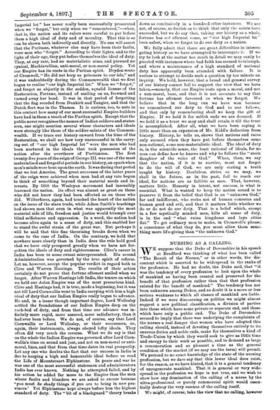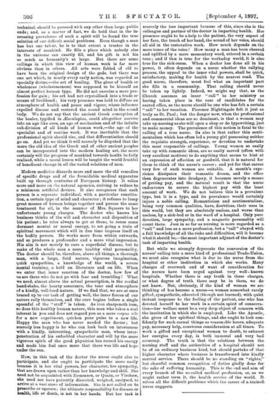NURSING AS A CALLING.
WE suppose that the Duke of Devonshire in his speech at Bradford was thinking of what has been called "The Revolt of the Nurses," or in other words, the dis- content which is asserted to be widespread in the ranks of the profession. He had no doubt, the Duke said, that "it was the tendency of every profession to look upon the whole of mankind as having been created and preserved for the benefit of that profession rather than that that profession existed for the benefit of mankind." The tendency has not been unknown among Dukes, and no doubt it is a more or lees serious weakness to which all classes of mankind are liable. Indeed if we were discoursing on politics we migl t. almost suggest a new political classification, a division of parties into those which have some private or separate end, and those which have only a public end. The Duke of Devonshire seemed to imply that there was underlying the complaints of the nurses a real danger that women who have adopted this calling should, instead of devoting themselves entirely to its onerous duties and noble ends, make for themselves a kind of Trade-Union by which they would seek to give as little time and energy to their work as possible, and to demand as large a remuneration and as pleasant a time as the general condition of the market (if we may use the term) will permit. We pretend to no exact knowledge of the state of the nursing profession, but we dare say that this lower ideal does exist, for the reason, as we have hinted, that it is a general tendenoy of unregenerate mankind. That it is general or very wide- spread in the profession we hope is not tree, and we wish to show how any domination of the calling of a nurse by the ultra-professional or purely commercial spirit would essen- tially destroy the very essence of the calling itself.
We might, of course, take the view that no calling, however technical, should be pursued with any other than large public ends ; and, as a matter of fact, we do hold that in the in- creasing prevalence of such a spirit will be found the true solution of our difficult social problems. Even though a man has but one talent, he is to that extent a trustee in the interests of mankind. He fills a place which nobody else in the universe can exactly fill, and his gift is not his so much as humanity's at large. But there are some callings in which this view of human work is far more obvious than in others. All arts were fabled of old to have been the original design of the gods, but there was one art which, in nearly every early nation, was regarded as specially divine,—the art of healing. The giver of health or wholeness (wholesomeness) was supposed to be himself an almost perfect human type. He did not exercise a mere pro- fession for gain ; his art had not crystallised into a trade or means of livelihood ; his very presence was held to diffuse an atmosphere of health and peace and vigour, whose influence expelled disease and restored the sound mind in the sound body. We do not say that the ancient Greek conception of the healer, typified in .11Esculapius, could altogether survive into an age like ours, an age of mechanism and of the infinite sub-division of all kinds of human work,—the age of the specialist and of routine work. It was inevitable that the professional spirit should rise, and that differentiation should go on. And yet we think it will scarcely be disputed that the more the old idea of the Greek and of other ancient peoples can be incorporated into the modern healing art, the more certainly will the progress of mankind towards health be fully realised, while a moral lesson will be taught the world fruitful of beneficent change in all the varied relations of men.
Modern medicine discards more and more the old remedies of specific drugs and of the formidable medical apparatus built up through centuries of European history. It relies more and more on the natural agencies, striving to reduce to a minimum artificial devices. It also recognises that each person is a separate individual, with a particular constitu- tion, a certain type of mind and character ; it refuses to lump great masses of human beings together and pursue the same treatment for all, in the manner of Mrs. Squeers to her unfortunate young charges. The doctor who knows his business thinks of the will and character and disposition of his patient ; he tries always to get at these, to rouse some dormant mental or moral energy, to set going a train of spiritual movement which will in due time impress itself on the bodily powers. He works more from within outwards, and so produces a profounder and a more vital impression. His aim is not merely to cure a superficial disease, but to make of the whole man a more healthy vital personality. The doctor should be, therefore, above all things, a thorough man, with a large, fluid nature, vigorous imagination, quick sympathies, a knowledge of the world, a severe mental training, a hold on literature and on life. When we enter that inner sanctum of the doctor, how few of us are there who do not go with fear and trembling ! What we need, almost above the actual prescription, is the cordial hand-shake, the hearty assurance, the tone and atmosphere of a kindly, well-bred nature. If we find that, we are at once braced up to our task of getting well, the inner forces of our nature rally themselves, and the cure begins before a single spoonful of the " stuff " is taken. As iron sharpeneth iron, so does this healthy human nature, this man who takes a real interest in you and does not regard you as a mere corpus vile for a new experiment, quicken your pulse to a new life. Happy the man who has never needed the doctor ; but scarcely less happy is he who can look back on intercourse with a kindly, interesting, sympathetic man, whose inter- penetration of his enfeebled character and will by the more vigorous spirit of the good physician has roused his energy and made him feel once more that there was life and hope under the sun.
Now, in this task of the doctor the nurse ought also to participate, and she ought to participate the more easily because it is her vital powers, her character, her sympathy, that are drawn upon rather than her knowledge and skill. She need not be acquainted with Ziemmsen, or Quain, or Virchow, she need not have patiently dissected, weighed, analysed, to arnve.at a vast store of information. She is not called on to prescribe or operate; the ultimate responsibility for disease or health, life or death, is not in her hands. But her task is scarcely the less important because of this, since she is the colleague and partner of the doctor in imparting health. Her presence ought to be a help to the patient, the very aspect of her face, the touch of her hand, the sound of her voice, should all aid in the restorative work. How much depends on the mere tones of the voice ! How many a man has been cheered and uplifted by a mere momentary word, uttered in a certain tone ; and if this is true for the workaday world, it is also. true for the sick-room. When a doctor has done all in his power, it often depends on a nurse whether the rallying process, the appeal to the inner vital powers, shall be quick, satisfactory, making for health by the nearest road. The good nurse, therefore, must feel what an important part she fills in a community. That calling should never be taken up lightly. Indeed, we might say that, as the Church assumes an inner "call" to her ministry as having taken place in the case of candidates for the sacred office, so the nurse should be one who has felt a certain "call" to her vocation. Florence Nightingale felt it just as truly as St. Paul ; but the danger now, when the professional and commercial ideas are so dominant, is that a woman may take up nursing as she will open a shop or do typewriting, just to make money. The prevalence of this notion is fatal to the calling of a true nurse. Se also is that rather thin senti- mentalism which has often led a young girl possessing neither the requisite strength, experience, or devotion to undertake this most responsible of callings. Young women so easily take up with romantic ideas, are so easily moved (often with. very excellent motives) to do anything that seems to hint at an expression of affection or goodwill, that it is natural for- them to think of the nurse's career ; and yet for that career very few of such women are suitable. A month's expe- rience dissipates their romantic dream, and the office then degenerates into drudgery, it becomes merely a means- of getting pay, and the natural result is that the nurse endeavours to secure the highest pay with the least amount of work. We do not believe this is a prevalent type, but it is a type, and its prevalence would certainly injure a noble calling. Romanticism and sentimentalism, being very common qualities, have, doubtless, their uses in this world, but they are absolutely useless, and worse than- useless, by a sick-bed or in the ward of a hospital. Only pure devotion, large sympathy, and a magnetic personality will, count there. Just in so far as nursing is more regarded as a. "call" and less as a mere profession, but a "call" obeyed with, a full knowledge of all the risks and difficulties, will it become what it should be,—the most important adjunct of the doctor's task of imparting health.
But while we strongly deprecate the conversion of the nurses' calling into a mere kind of professional Trade-Union, we must also recognise what is due to the nurse from the- hospital or other institution in which she works Many charges of overwork and of want of consideration for- the nurses have been urged against very well - known hospitals. Whether there is any truth in these charges, or what degree of truth there may be in them, we do not know. But, obviously, if the kind of woman we are- thinking of has become a nurse—a woman somewhat rarely gifted, sympathetic, educated (though not learned), with quiet instant response to the feeling of the patient, one who has. devoted herself to her work in a certain spirit of consecra- tion—her welfare must be a very deep object of concern with the institution in which she is employed. Like the Apostle,. she gives of her spiritual things, and she ought to look con- fidently for such carnal things as reasonable hours, adequate pay, necessary help, courteous consideration at all times. To- work a gifted and exceptional woman to death, to exhaust her energies every day, is both immoral and very bad, economy. The truth is that the relations between the nursing staff and the authorities of a hospital should not be of an ordinary business kind, but should partake of that- higher character where business is transformed into kindly mutual service. There should be no standing on "rights," but cheerful common recognition of duties gladly done for- the sake of suffering humanity. This is the end and aim or every branch of the so-called medical profession, or, as we- might rather term it, the health service of the world. It. solves all the difficult problems which the career of a. trainedt nurse suggests.



































 Previous page
Previous page